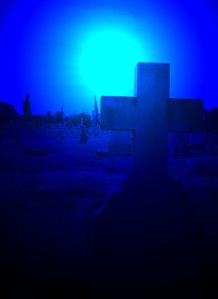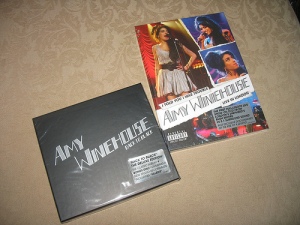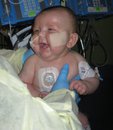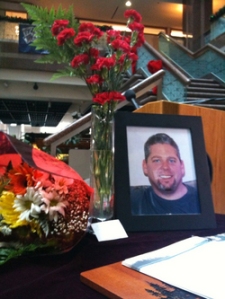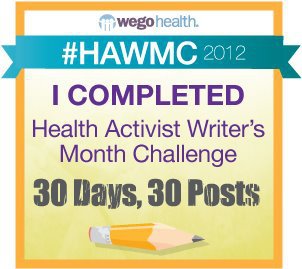 I was watching The Apprentice when I got the news that my Dad had died. I should have known as soon as I looked on the phone display that something was wrong. Although it was a reasonable enough hour in my own time zone, it was three in the morning in South Africa. Be that as it may, when I answered the phone, I had no idea that I had lost a parent. Even though Dad had been gravely ill in hospital, the news came as a terrible shock.
I was watching The Apprentice when I got the news that my Dad had died. I should have known as soon as I looked on the phone display that something was wrong. Although it was a reasonable enough hour in my own time zone, it was three in the morning in South Africa. Be that as it may, when I answered the phone, I had no idea that I had lost a parent. Even though Dad had been gravely ill in hospital, the news came as a terrible shock.
The story of Dad’s illness and death is all too common these days. He had been sick on and off for a couple of years, but despite numerous visits to the doctor, cancer had only been diagnosed six weeks prior to his death. By then, the tumour in his bladder was too big to remove, and Dad’s only shot at survival was aggressive chemotherapy followed by surgical removal of the entire bladder. He survived the chemotherapy – only just – and he made it through the twelve-hour operation. In the end, though, his body was just too weak to survive all that it had been put through, and a few days after the surgery, he winged his way from this world to the next.
It was December 6th, 2004. Seven years ago today.
When we lose someone close to us, we are supposed to go through the stages of grief. Denial. Anger. Bargaining. Depression. Acceptance.
I had heard of this theory, of course, but I had never really found it to be of any use. It suggests that these stages happen sequentially, that you cannot ever get to acceptance until you have passed through the other four stages. According to this theory, once you are in the Acceptance stage, you’re done with your grieving.
The reality is that grieving is such a personal, individual process, and everyone does it differently. Denial has definitely been a big part of my own experience, and although I am mostly over that, I still have moments of thinking, “Gone??? What do you mean, gone? That’s impossible!” By contrast, I have not spent a single moment in the Bargaining phase, although that could still be coming.
What about this one, though? Guilt. Where does that fit in with this whole stages of grieving thing? I’m sure I’m not the only one to experience it with the death of a loved one. What could I have done? Why didn’t I travel home to see him before he died? Why am I remembering every argument we ever had, when I should be focusing on the many good times we shared?
The stage of grief that I have the biggest problem with, though, is acceptance. This is supposed to be the pinnacle, the reward we can all look forward to if we can just get through all of the other stuff that comes before it. But is it really truly attainable? Yes, we can get to a point where we can lead our lives without the person we have lost, but can we ever fully accept it? Can my Mom, who was married to Dad for forty years, be reasonably expected to completely reconcile herself with the fact that her husband – her best friend, the man she lived with, travelled with, and raised children with – is no longer by her side?
Here’s the bigger question: what does acceptance really mean? It seems to me that once someone reaches that magical stage, they are expected to be OK. They are not allowed to be sad anymore because their grieving is done. And honestly, there is a part of me that doesn’t really want to reach that stage. Because doesn’t acceptance imply that you are OK with the person not being around anymore? And isn’t that a form of betrayal to them? Like you’re prepared to finally let go of what little you have left of them?
To some people, the stages of grief can be a useful roadmap, a guide to let them know what’s coming next. For me, it’s frustrating. I loop back and forth between the stages too much, and I’m ambivalent about the prize. I mean, how likely am I to strive for acceptance if it’s not what I really want?
So today, seven years after Dad left us, I don’t really know where I am with this whole grieving process.
What I do know is that Dad was many things to many people. He was a great marathoner in his youth and he fuelled my own love of running. He was an astute businessman who gave me countless tidbits of financial advice and did my taxes every year in exchange for a bag of sugar-coated almonds. He was both reader and storyteller, dramatist and comedian. He had an appreciation for the simple pleasures in life, and would take his time washing the dishes just so he could watch the sunset through the kitchen window while he was doing it. He adored his dogs and cats, and spent many Sundays polishing his car surrounded by family pets. Along with my Mom, he gave me and my brother the opportunity to grow up witnessing what a loving, supportive partnership should look like. To me and my brother, he was Dad – the best one we could have asked for. And during the brief period of time for which he shared a planet with my son George, he was the most loving, doting Granddad any kid could wish for.
I don’t know what happens to us when we die. I choose to believe that Dad is around somewhere, watching fondly over his grandsons, cheering me on when I run races, clicking his tongue impatiently when I make stupid decisions, and having a good old giggle when I get caught in the rain and wind up with a bad hair day.
Rest in peace, Dad. Someday, I’ll see you on the other side.

